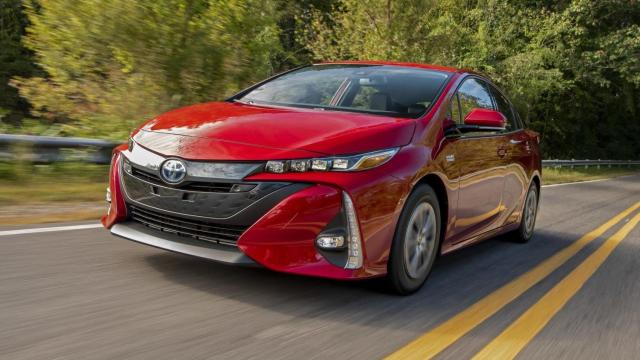For nearly 20 years, the Toyota Prius has been the car associated with environmentalism. Maybe it’s getting overshadowed a bit by pure EVs, but the image it projects is still very clear. If you gave even the slightest shit about the environmental impact of the car you drove, you get a Prius. And this lent an image of environmental friendliness to Toyota as well.
This environmental-friendly label was never really justified, for reasons we’ll get to in a minute. But Toyota outed itself by joining General Motors, Fiat Chrysler, Mazda, Mitsubishi, Nissan, Hyundai, Kia and Subaru on the Trump Administration’s side of the Clean Air Act fight with the state of California. (Subaru’s inclusion in the list also raised some eyebrows given its environmentalist image as well).
Now, some Toyota owners, especially Prius drivers, are saying they’ll look elsewhere when buying their next car. Here’s the Washington Post:
Ken Spaeth, who works in healthcare IT in Conifer, Colo., said that when he bought his Prius in 2007, some of his friends and family wondered if the new-fangled hybrid engine would hold up. “It was still, ‘Wow, that’s crazy. Why would you want to buy a hybrid vehicle?’” Spaeth said. More than a decade later, he feels vindicated. The odometer on his Prius, which he still drives to work, is about to hit 152,000 miles (244,620 kilometres).
But that doesn’t mean he would buy a Toyota again, especially given its decision to side with Trump. “If I had my druthers, I’d probably buy an all-electric vehicle and I don’t know that I would be looking at Toyota’s offerings,” he said, adding that he may buy a Tesla “if I could afford it.”
Toyota declined to comment for this article but pointed Gizmodo to its statement from October, which claimed the company sells “more alternative powertrain vehicles than the rest of the industry combined.”
Of course, former Prius owners have been looking elsewhere for some time. Prius sales have tanked from their 2012 high of 236,655 units all the way down to 87,590 last year, probably because Prius isn’t the only good hybrid out there anymore and a lot of environmentally conscious buyers are looking to full EVs such as Teslas like our man Ken Spaeth up there. (Additionally, a pretty good amount of Prius drivers bought in to save on gas, and gas has been cheap for some time, clearing the way for them to buy SUVs instead.)
Still, this whole ordeal has served as yet another reminder that Toyota has never been even close to the most environmentally friendly automaker when it comes to emissions and fuel efficiency.
Jonna Hamilton, a senior manager of government affairs at the Union of Concerned Scientists (and another aggrieved Prius driver), reminded us of this fact in a recent blog post:
Toyota has spent a lot of time and effort over the last couple of decades positioning themselves as the “green” automaker. The Prius was one of the first mainstream gasoline-electric hybrids for sale in the US and it is a great car. It has also sold pretty well for Toyota and has had the added side benefit of making everyone think that Toyota is an environmentally-conscious company. But the data don’t fully support that idea.
Hamilton cites last year’s EPA report on emissions and fuel economy trends which concluded that from 2012 through 2017, the five years in which the combined EPA Greenhouse Gas Emissions and NHTSA CAFE regulations have been in place, “Of these thirteen manufacturers [Honda, Mazda, Hyundai, Subaru, Kia, Nissan Mitsubishi, VW, BMW, Toyota, Mercedes, Ford, GM, FCA] all except for Toyota improved CO2 emissions and fuel economy.”
Hamilton explains how this happened:
Their pick-up trucks are less efficient than most of their competitors and they are far behind the industry leaders when it comes to electrification – their plug-in Prius can go a mere 25 miles (40 kilometres) on a charge before turning over to the admittedly efficient gasoline engine, and they offer a low-volume fuel cell vehicle only in California. They aren’t currently selling any other EVs across the U.S.
The new RAV4 plug-in hybrid may help matters some, but given that every other manufacturer is taking greater strides towards electrification, Toyota will likely stay at the bottom of the fuel economy barrel for some time until they get serious about it.
No automaker is truly environmentally friendly, but some are better than others. Mazda, Hyundai and Subaru rank highly on average fuel economy, but they also joined Toyota in supporting the Trump administration’s fuel economy rollback.
This leaves Honda as the clear choice for most fuel-efficient car manufacturer that also isn’t actively lobbying to fuck everything up; in fact, they’re one of the four automakers that reached an agreement with California on a compromise fuel economy standard.
I’m not saying you definitely shouldn’t buy a Prius. But the company that makes the Prius is the only major automaker that reportedly pollutes the world more than it did five years ago, and that seems like something Prius owners might care about.
